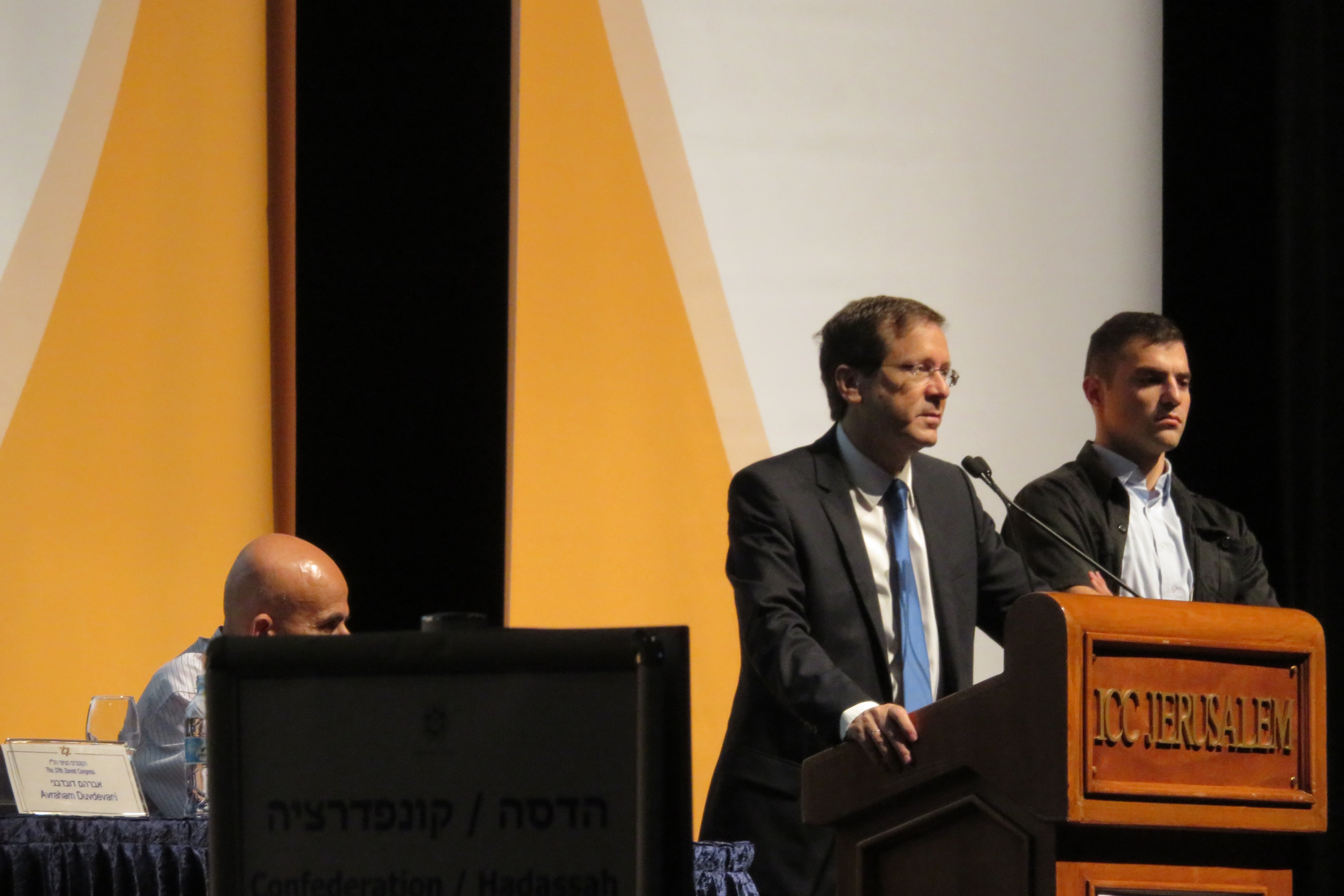
World Zionist Congress Declares Jewish People Indigenous
By Jonathan Benedek
Last week, the World Zionist Congress convened for the 37th time since its founding in 1897, at Jerusalem’s International Conference Center. One of the highlights of this year’s Congress was a resolution that passed by a slim majority of 51%, declaring the Jewish people a Semitic people, indigenous to the land of Israel.
“When we deny our roots and the story that we belong here, we reinforce the anti-Israel accusation that we are thieves,” said Rabbi Gavriel Reiss, head of Israel Programs for LAVI, explaining the motivation behind the resolution to Tazpit Press Service (TPS).
The LAVI organization, which works to inspire young adults to become active participants in Jewish history, initiated the resolution with its first ever slate of delegates attending the World Zionist Congress. The resolution declared that “the Jewish people is a Semitic people, indigenous to the Land of Israel and seeking international recognition of its indigenous status.”
LAVI had established the Alliance for New Zionist Vision to participate in elections for the Congress. Its platform calls for making Zionism relevant to the next generation, empowering student activists and young professionals to take leadership roles within the Zionist movement, and defining the next practical goals of Jewish liberation.
While most Congress delegates were significantly older, LAVI’s alliance was the only party to exclusively run young adult candidates at the forefront of campus battles and struggles over Jewish identity. Rabbi Reiss told TPS that with its indigeneity resolution, LAVI intended to combat the confusion surrounding identity for many Jews of the millennial generation.
“One goal of the resolution was to answer important questions regarding identity,” said Reiss. “There’s a crisis in Jewish identity worldwide, especially in the United States with many young Jews seeing themselves as Americans with a Jewish religion and not as part of a proud ancient people from the Middle East.“
Reiss also believes that while refuting the anti-Israel accusation that Jews are foreign invaders in the Middle East, collectively identifying as an indigenous people could help Israel make peace with the Palestinians, as well as with the other Semitic peoples of the region.
“I believe that if we self-identify as a native Middle-Eastern people who was exiled yet somehow managed to return, it not only makes our presence here more understandable to our neighbors but also opens doors for us to build better relationships,” Reiss argued.
LAVI, whose diverse team of delegates included bearded rabbis, tattooed artists, advertising executives and student activists, came to the World Zionist Congress with the goal of helping the Jewish world move past what the movement describes to be “outdated ideological paradigms” and the “superficial linear political spectrum.”
While LAVI rejects what it calls “shallow establishment mantras of Jewish unity”, it seems to have successfully united young adults from various backgrounds behind a new vision for Israel’s future.
“The goal was to challenge the political spectrum and break free of the left versus right, religious versus secular paradigms,” Reiss noted to TPS. “We obviously feel connected to this land and don’t want to see it divided. We relate to the central mountain region as the cradle of Jewish civilization.”
“We don’t see Israel occupying foreign territory but we do see Palestinians living under a military occupation,” he continued. “Palestinians are very much the victims of Israeli indecisiveness regarding the territories, which has resulted in all the injustices one would expect from a situation in which a population is forced to live under a military bureaucracy for half a century.”
LAVI intended to garner support from liberal Zionist factions by arguing that Israel embracing its Semitic identity would not only refute the accusation that Jews are colonialists but also change the context of the conflict and create better conditions for peace. “It is an issue that transcends the traditional left-right paradigm because it is offering a new lens through which we can view the conflict,” Reiss elaborated.
Despite LAVI’s efforts, the liberal Zionist delegations, including Hatikva, ARZA and MERCAZ, voted against the resolution. Rabbi Josh Weinberg, President of ARZA (Association for Reform Zionists of America) told TPS he thought the resolution was unnecessary.
“I think that we all agree as Zionists that we the Jewish people have a claim to the land, and I don’t think that people should take anyone seriously who claims to the contrary,” stressed Weinberg to TPS. “I just didn’t see the need for another separate resolution justifying our presence in Israel.”
“The question for me is not about the past, but about the future,” he added. “How does declaring that we’re indigenous affect my behavior tomorrow? I wanted to go for resolutions that really focused on what kind of a state we want the Jewish state to be.”
Challenging Weinberg’s perspective, LAVI delegate Jonathan Kadoch asked, “if we can’t even say we belong here, that we have deep roots here, how can we expect our neighbors to make peace with us? Wouldn’t it be easier for Palestinians to make peace with a people that at least self-identifies as Semitic than with a people they perceive as European invaders?”
“To ignore the fact that we’re from Israel and that we’re an indigenous people is to completely dismiss our entire identity and to legitimize the accusation that we are western colonialists,” Kadoch continued.
While the resolution made a strong case for recognizing Jewish indigeneity to the land of Israel, it was also careful to acknowledge that this does not negate the indigenous status of any other people to the country.
Reiss told TPS he remains hopeful of helping the Jewish world to move beyond the political spectrum. “I would like this to at least be an opening for further discussion with organizations like ARZA and the movements within Hatikva,” he said. “They have many idealists among them, and these are exactly the Jews we should be engaging.”